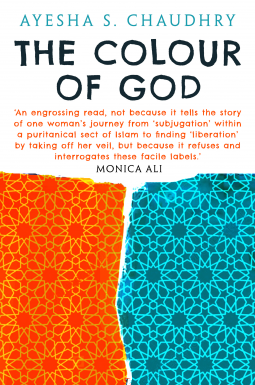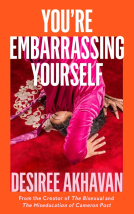
The Colour of God
A Story of Family and Faith
by Ayesha S. Chaudhry
This title was previously available on NetGalley and is now archived.
Send NetGalley books directly to your Kindle or Kindle app
1
To read on a Kindle or Kindle app, please add kindle@netgalley.com as an approved email address to receive files in your Amazon account. Click here for step-by-step instructions.
2
Also find your Kindle email address within your Amazon account, and enter it here.
Pub Date 11 May 2021 | Archive Date 30 Apr 2021
Talking about this book? Use #TheColourofGod #NetGalley. More hashtag tips!
Description
Shortlisted for the William Saroyan International Prize 2022
‘Engrossing...brilliant’ Monica Ali
‘Heartbreaking and really funny’ Ross Gay
‘This book fell into my heart’ Sabrina Mahfouz
‘The kind of authentic voice that is rarely heard’ Saima Mir
Ayesha tells the story of growing up in a fundamentalist Muslim household; of parents who spent most of their lives away from Pakistan; of stealing her mother’s hijabs to wear to school as a five-year-old; of revisiting the beliefs and ideals she was raised with; of failed dreams and heartbreaks, but also of joy and love.
Life-affirming and funny, The Colour of God uncovers surprising answers to questions of faith, belonging, family and liberation, and offers a vision of freedom that isn’t measured in fabric.
Advance Praise
''The Colour of God is an engrossing read, not because it tells the story of one woman’s journey from "subjugation" within a puritanical sect of Islam to finding ‘liberation’ by taking off her veil, but because it refuses and interrogates these facile labels. Chaudhry is brilliant at dissecting how fundamentalism took root in her family, and she’s equally good at holding up a mirror to the culture that tends to dehumanise those who don’t conform to its norms.' - Monica Ali, author of Brick Lane and Refugee Tales
'The Colour of God meditates on the ways--illuminates the ways--identity, nation, religion, gender, and family are constituted and troubled. It's heartbreaking and, at times, really funny; the profoundly generous heart behind the questions this book asks.' - Ross Gay, bestselling author of The Book of Delights
Available Editions
| EDITION | Other Format |
| ISBN | 9781786079251 |
| PRICE | US$25.00 (USD) |
| PAGES | 304 |
Featured Reviews
When @sofiareading mentioned that Ayesha S. Chaudhry is going to publish a book, I immediately check it up and it turned that the book is not an academic text but a memoir! It is always compelling that the scholar that you used to read their works for education purpose is writing something less theoretical but more personal one. So I was enthusiastic to read it.
I was hoping to find out how she became a Professor of Islamic Studies and Gender Studies. Yet book is beyond Ayesha S. Chaudhry’s personal memoir. This book is not only a South Asian descent woman’s memoir. This book is Muslim woman’s memoir. I could highlight every page as they all resonates with me.
She recollects her and her family’s lived experiences: as a Canadian Muslim woman from Pakistani parents who embrace puritanical Islam after failed attempt on assimilation because of racial discrimination. She explores the desire of belonging to the community where she lives in with her hijab and niqab on, patriarchal tyrants, her ideal of state & citizenship, taking ownership of one’s own body, typical (South) Asian mother-daughter relationship, and the loss of her loved one.
The book is fiercely honest, it lays bare the bitter truth of being raised in the fundamentalist Muslim household. Her voice here is many women’s voice out there which sometimes seen as oppressed by the West when it is actually their rejection to these people that then they decide to amplify their religious identities. She uncovers the stories of resistance to the patriarchal Islam and Islamophobic society and institution.
I was repeatedly heartbroken and entertained as she tells the stories eloquently from beginning to end. Could you imagine how a story of body hair could move from personal, philosophical, religious to political? She places Qur’anic verse, Prophetic and Urdu sayings making them relevant to the story she is telling, making the historical universal.
Behind her intellectual state today lays a long chain of distinctive spiritual events that is heartening to learn from. There no denying it goes into my Favourites List 2021, a very memorable one!
Thank you @oneworldpublications for sending me the e-ARC through @netgalley. If you reading a memoir from Muslim woman is on your #ReadingToChallenge list, then this book is unquestionably for you. It will be published on May 11th 2021 so you can pre-order now.
Chaudhry’s memoir traces her family’s roots in Pakistan and her parent’s two-ing and froying from Canada as they try and assimilate into the white western settler environment. Ultimately they (rightfully) reject, assimilation. They choose instead to align with fundamental Islam and a puritanical view of a religious life. From her she regales stories of wearing niqab, interacting with white feminists who want to ‘free her’ and men who want to take advantage.
Woven throughout are Quranic verses, historic retelling and present-day stories, combined it is compulsively readable in tone, reminding me the memoir can teach much more than a family history.
Most notable was her smart look at patriarchal systems in both her fundamentalist Islamic upbringing and white western culture, she’s clear on that. Patriarchy has infiltrated almost all facets of human existence, it is impossible to escape and is not inherent to one religion or group. It must be abolished as a collective. Her writing shines with humility as she delves into her own mistakes and looks back on a life that feels like many.
It is a book of multitudes, simultaneously Chandhry interrogates her position as a woman, a daughter of immigrants, a sister of a grieving sibling, a member of Islam, a wife of a Muslim man. Here she is, case and point, demonstrating why we must take each story as a singular and each person as an individual. There is no us and them.
Readers who liked this book also liked:
Brian Azzarello; Chris Condon; J. Holtham; Stephanie Phillips; Jason Aaron; Tyler Crook; Matt Kindt; Corinna Bechko; Jay Stephens; Amy Roy
Comics & Graphic Novels, Horror






